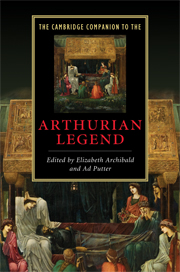10 - Imperial Arthur: home and away
from Part II - Themes
Published online by Cambridge University Press: 28 March 2010
Summary
Arthur starts his main literary career in the ninth-century Historia Brittonum as a military general, a dux bellorum who fights in twelve battles with the British kings against Saxon invaders. In Geoffrey of Monmouth's Latin Historia Regum Britanniae, or History of the Kings of Britain (1130s) he becomes a king himself, defeats the Saxons, then goes on to conquer all Britain and Ireland, many of the northern kingdoms, a large area of southeastern Europe (Dacia), and territories in Gaul that are now parts of France. In further warfare against the Roman Empire, Geoffrey's Arthur defeats the forces of its general Lucius and a large number of tributary monarchs from Middle East, Asian and African regions. He is just about to cross the Alps and take over Rome when his nephew, Mordred, begins a rebellion back in Britain. Arthur returns to defeat Mordred's army, made up of his old enemies - Scots, Picts, Saxons and Irish - but is mortally wounded and departs to the island of Avalon. Although he hands on Britain intact to his nephew, Constantine, civil war in subsequent reigns leaves it vulnerable to further invasion. Far from controlling much of Europe, the British soon enough lose most of their own kingdom to the Saxons. Geoffrey's inventive story allowed the later Middle Ages to consider Arthur as an international conqueror as well as a king; from the early fourteenth century he took his place amongst the Nine Worthies - Jews, pagans and Christians famous for military success.
- Type
- Chapter
- Information
- The Cambridge Companion to the Arthurian Legend , pp. 171 - 187Publisher: Cambridge University PressPrint publication year: 2009
- 1
- Cited by

